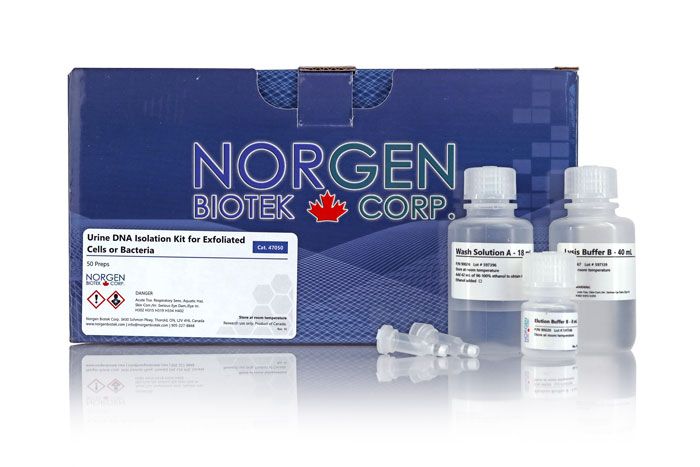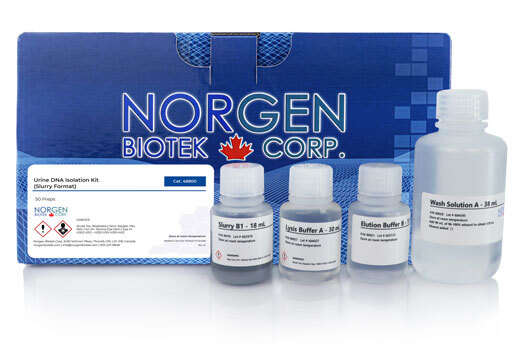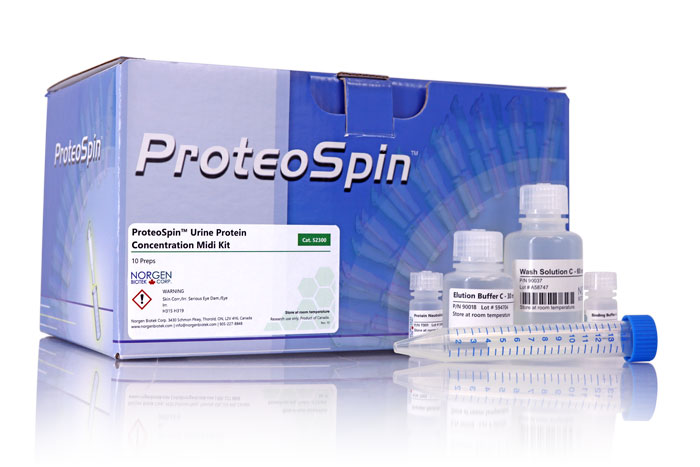Urine DNA Isolation Kit for Exfoliated Cells or Bacteria
For the rapid and efficient purification of DNA from exfoliated cells or bacteria in urine

For research use only and NOT intended for in vitro diagnostics.
Urine DNA Isolation Kit for Exfoliated Cells or Bacteria
For the rapid and efficient purification of DNA from exfoliated cells or bacteria in urine
Register today to receive an exclusive 15% off* on your first order.
Features and Benefits
- Isolate genomic DNA from either exfoliated cells or bacteria found in urine
- Isolate and detect genomic DNA from as little as 1 mL of urine and up to 50 mL urine
- High quality DNA for sensitive applications
- Rapid processing time
Norgen’s Urine DNA Isolation Kit for Exfoliated Cells or Bacteria is designed for the rapid isolation of either: 1) human genomic DNA from exfoliated cells that have been shed into the urine from the urinary tract; or 2) bacterial genomic DNA from urine samples. The kit allows for the isolation of DNA from 1 to 50 mL of urine. The genomic DNA isolated from exfoliated cells can be used in a number of diagnostic and research applications including the diagnosis and monitoring of bladder, kidney, or other urinary-tract cancers. Bacterial genomic DNA from both human urine samples and urine samples from animals can be isolated with this kit in order to study the levels and types of bacteria that are present. The kit allows for the isolation of genomic DNA from both Gram negative and Gram positive bacteria, including E. coli, Proteus spp., Klebsiella spp., Enterobacter spp., Serratia spp., Pseudomonas spp, Clostridial ssp. and Leptospirosis spp.Chlamydia trachomatis and Neisseria gonorrhoeae.
Typical yields of human genomic DNA from exfoliated cells will vary depending on the cell density of the urine sample, which is affected by a number of factors including health, diet and sex of the individual donating the urine. Typical yields of bacterial genomic DNA will vary depending on the urine sample and the bacterial species, if any, present in the urine. Healthy humans generally have < 10, 000 CFU of bacteria per mL of urine, and this kit is sufficiently sensitive to isolate and detect DNA from even this minimal amount of bacteria. The genomic DNA purified with this kit is fully digestible with all restriction enzymes tested, and is completely compatible with downstream applications such as PCR, qPCR and Southern Blot analysis.
Details
Supporting Data
Figure 1. Isolation and Detection of Biologically Active Genomic DNA from 1 mL of Urine. Genomic DNA was isolated from the exfoliated cells found in a 1 mL urine sample using Norgen's Urine DNA Isolation Kit for Exfoliated Cells or Bacteria. The purified DNA was eluted in 100 µL of Elution Buffer, and 5 µL of the isolated DNA was used as a template in quantitative PCR using human beta actin gene primers to detect the genomic DNA using the iQ SYBR Green Supermix (BioRad, #170-8882). The red lines in the PCR baseline graph above correspond to DNA standards, while the blue line corresponds to the successful PCR results when DNA isolated from the exfoliated cells in 1 mL of urine was used as the template.
Figure 2. Isolation and Detection of Bacterial Genomic DNA from a 1 mL Urine Sample. Bacterial genomic DNA was isolated from a 1 mL urine sample from a healthy individual using Norgen's Urine DNA Isolation Kit for Exfoliated Cells or Bacteria. The provided protocol was followed, and the purified urinary bacterial DNA was eluted in 100 µL of Elution Buffer. Five microliters of the eluted DNA was then used as a template in a quantitative PCR reaction to detect the bacteria using the iQ SYBR Green Supermix (BioRad, #170-8882). Healthy humans generally have <10, 000 CFU per mL of urine, and this kit is sensitive enough to isolate genomic DNA from this small amount of bacteria (blue line in graph above). The red lines in the above graph correspond to DNA standards.
Figure 3. Isolation of Genomic DNA from both Gram-Positive and Gram-Negative Urine Bacteria. Norgen's Urine DNA Isolation Kit for Exfoliated Cells or Bacteria was used to isolate genomic DNA from 1mL urine samples spiked with the Gram-positive bacteria B. cereus (1 million cells/mL) (Lanes 1 and 2), and the Gram-negative bacteria E. coli (1 million cells/mL) (Lanes 3 and 4). The provided protocol was followed, and the bacterial DNA was eluted in 100 µL of Elution Buffer. One tenth from each elution was loaded on 1.2% agarose gel. Lane M is Norgen’s MidRanger 1kb DNA Ladder. As it can be seen, genomic DNA could be successfully isolated from both Gram positive and Gram negative bacteria.
|
Kit Specifications
|
|
|
Minimum Urine Input
|
1 mL
|
|
Maximum Urine Input
|
50 mL
|
|
Time to Complete 10 Purifications
|
10 minutes
(Plus a 30 minute incubation - Bacteria) (Plus a 15 minute incubation - Exfoliated) |
Storage Conditions and Product Stability
All solutions should be kept tightly sealed and stored at room temperature. This kit is stable for 2 years after the date of shipment. The kit contains a ready-to-use Proteinase K, which is dissolved in a specially prepared storage buffer. The buffered Proteinase K is stable for up to 2 years after the date of shipment when stored at room temperature.
| Component | Cat. 47050 (50 preps) |
|---|---|
| Resuspension Solution A | 20 mL |
| Lysis Buffer B | 40 mL |
| Wash Solution A | 18 mL |
| Elution Buffer B | 8 mL |
| Proteinase K in Storage Buffer | 1.2 mL |
| Micro Spin Columns | 50 |
| Collection Tubes | 50 |
| Elution Tubes (1.7 mL) | 50 |
| Product Insert | 1 |
Documentation
FAQs
Spin Column
- There is very little or no cells in the urine.
The expected amount of bacteria in a urine sample is typically low. A healthy individual usually has < 10,000 CFU/mL, therefore it is possible that the urine sample has very little bacteria present. Cell number in a urine sample varies. While individuals with various diseases have > 1000 exfoliated cells per mL of urine, a healthy male may have a number much lower than the 1000 cells per mL limit.
The genomic DNA isolated may not be visible when resolved on an agarose gel. In such cases, a larger input volume may be used. Alternatively, a more sensitive method such as BioAnalyzer or PCR amplification may be used for detection. - Incomplete lysis of cells.
Extend the incubation time of Proteinase K digestion or reduce the amount of bacterial cells used for lysis (reduce the urine input). The cells are old Older samples contain prematurely lysed cells which release endonucleases and can degrade DNA. Fresh urine samples are recommended.
- The DNA elution is incomplete.
Ensure that centrifugation at 14,000 RPM is performed after the 8,000 RPM centrifugation cycle, to ensure that all the DNA is eluted.
- The genomic DNA was handled improperly.
Pipetting steps should be handled as gently as possible. Reduce vortexing times during mixing steps (no more than 10-15 seconds).
- The urine sample is old.
Proteases and DNAses may be present in the sample. Storing the sample for too long before DNA isolation increases the chances of recovering sheared DNA. The use of fresh urine samples is recommended.
Citations
| Title | Genomic complexity of urothelial bladder cancer revealed in urinary cfDNA |
| Citation | European J of Human Genetics 2016. |
| Authors | Fiona S Togneri1, Douglas G Ward2, Joseph M Foster3, Adam J Devall2, Paula Wojtowicz1, Sofia Alyas1, Fabiana Ramos Vasques1, Assa Oumie3, Nicholas D James4, KK Cheng5, Maurice P Zeegers6, Nayneeta Deshmukh2, Brendan O'Sullivan7, Philippe Taniere7, Karen G Spink3, Dominic J McMullan1, Mike Griffiths1 and Richard T Bryan |
| Title | Performance of the HSV OligoGen kit for the diagnosis of herpes simplex virus type 1 and 2 |
| Citation | Diagnostic Microbiology and Infectious Disease 2016. |
| Authors | Parra-Sánchez, M., López, A. M., García-Rey, S., Breval, I. Z. Y., Martínez, S. B., Rodríguez, I. P., ... & Folía, J. C. P |


